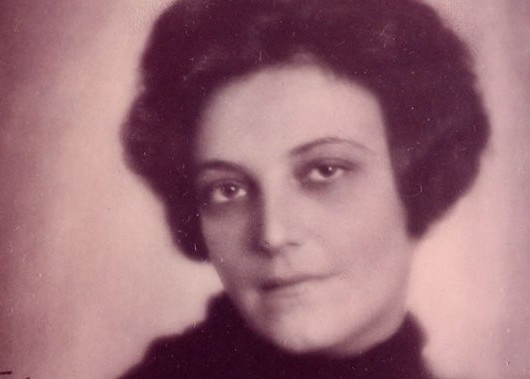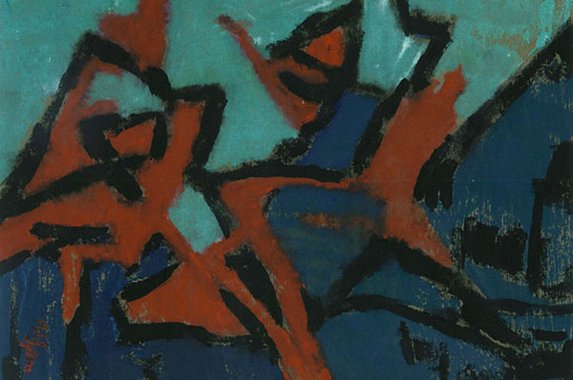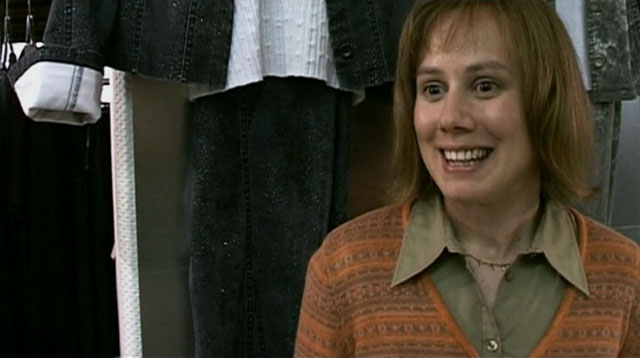The Austrian writer and painter Mela Hartwig wrote Am I a Redundant Human Being circa 1931. It was not published until 2001 in German, and in English in 2010.
Our narrator, Luise, suffers from two afflictions of personality: first, a near-total lack of inspiration in how to live her life; and second, a painful awareness that leads her to self-immolating criticism. Neither of those alone would make for such a sad story, but Luise is also socially offputting, and she inspires little in others beyond bemusement and irritation. I think that one of the reasons this book hasn’t received much notice is that the novel will alienate someone not in sympathy with Luise’s peculiar afflictions. Hartwig does not make it easy to have sympathy for her; she doesn’t want to make it easy. That’s the point of the novel.
The opening is explanation enough:
I’m a secretary. I have nearly twelve years of experience. My shorthand is first rate and I’m an excellent typist. I don’t mention it to brag. I just want to show that I amount to something. I’m ambitious.
I repeat: I’m ambitious. I’m hopelessly ambitious. Even though I certainly have reason to be humble. Reason enough to use modesty to avoid making the deficit between my talent and my ambition too obvious.
Luise is hard on herself, but not morally. Her wish is not to be a good person. She is not measuring herself against an ethical ideal or a societal model of what a woman should be (she confidently asserts that she is not unattractive, just nondescript), but against an aggressive inner conception she has for herself, whose origin is unclear. She wants to be something. It’s a very vague idea, and that’s her problem: she finds herself unable to fill it in, to flesh it out. She wants to be more passionate, more absorbed, more adventurous, but she has no preference for how these traits should express themselves.
Hartwig’s real achievement in this book is to keep the language at once abstract yet piercingly clear. It’s done quietly enough that it’s only by comparison with other mediocre novels of this sort that Am I a Redundant Human Being? appears superior. Hartwig is very sharp in expressing half-formed emotions and generalized frustrations in vivid language. (And credit to translator Kerri A. Pierce for rendering it well in English.) Hartwig sets up small loops of thought like these:
I didn’t use my ambition to demand more of myself than I was capable of giving–I simply used it to expect more of myself than I was capable of giving. (48)
My lack of diligence is even more inexplicable since I actually had a good example in my colleague that it would have been worth emulating. Of course, I had the desire to perform at her level, to become as capable as she was, to learn the art of standing out, of making myself indispensable–but at the same time, I was convinced that it was futile for me to want anything. (49)
Such thoughts are difficult to phrase so well.
So Luise looks to others for models, even while half-realizing that she is being stupid in doing so. She is “pathetically attracted” to her supremely confident schoolmate Johanna, then later experiences the rush of being in a political rally, melting into “The Mob,” and feeling passionate about something, only to lose all interest when she is once more alone.
She falls in with a couple men. There is Emil, whose love she pathologically doubts (for who could love her?) until he leaves her. But she is detached about the end of the relationship:
It hurt me to have lost him, but it hurt me even more to have lost his love…Dismayed, I realized that what I missed most about Emil K. was seeing myself through his eyes. Therefore, I reached an appalling conclusion: I could trust my pride, but not my heart. (61)
There’s Anton, whose love she doesn’t doubt, but whose love signifies his worthlessness:
However, I couldn’t overlook the fact that he was impressed by what I wanted to be, and couldn’t see me for what I really was. He respected me for my struggling to make something of myself without realizing that this struggle was futile. As they say, the proof was in the pudding: I came to see that my low opinion of him was perfectly justified. (67)
The ruthless logic of Luise’s self-criticism provides something of a shield for her against the world. After being seduced by a lying lothario, she feels tremendously betrayed, but also strangely liberated, for now she doubts others as well: “turning my doubt outward made it far easier to bear.” She doesn’t act like a victim should act–this makes her offputting.
This is not to say that Luise’s self-assessment is justified. That’s really beside the point. Several reviews complained that there was no seeming reason for her level of self-loathing, as though the lack of a clear cause makes her unconvincing. The point is that for every Johanna, there is a Luise, and we should understand that regardless of causes. Citing causes would excuse Luise as well as us from responsibility, and neither Hartwig nor Luise want that. The reader doesn’t get to be on the side of the angels while reading this novel.
The latter half of the book concerns her relationships with lovers Elizabeth and Egon. She first idolizes Elizabeth, who is described in terms eerily similar to that evoked by the description of Borderline Personality Disorder:
She was whoever she wanted to be at a given moment: the heroine of the novel she was reading, the protagonist of the tragedy or comedy she was rehearsing. Simply being herself wasn’t enough for her…Her will was strong. But it seems to me that she primarily used her will to deceive herself, to enable herself to believe wholeheartedly in the woman she was pretending to be, to feel completely at home in whatever character she’d just slipped into. (81)
Luise looks up to Elizabeth but because she wants to mimic Elizabeth and not enable her, Elizabeth doesn’t take to her too strongly. Luise has nothing to offer the borderline. No folie a deux results: Luise sees Elizabeth too clearly, envying her while exposing her. But after Elizabeth commits suicide as a result of her lover Egon leaving her, Luise sees her real chance, to take Elizabeth’s place. She pursues Egon.
It obviously doesn’t work out. While Egon is contemptuous and indifferent, unwilling to deign even to take advantage of Luise, Luise herself can’t commit fully to playing the role of Elizabeth. She makes a good go of it, but she can’t convince herself, nor can she convince Egon.
The book is not quite a tragedy. There’s something to Luise’s self-awareness that, if not liberating, possesses survival value. Luise does figure out what she’s doing, and she reconfigures her life so that she does not end up a passionate suicide like her erstwhile idol Elizabeth. It is an unsatisfying, limited life, especially relative to her insistent ambition. Perhaps part of her would actually prefer to be a passionate suicide, but there is also a stubborn pride to Luise’s attitude, an arrogance that makes her certain that she has seen the world aright. Perhaps if she had questioned that certainty….
The character of Luise reminds me most of Melanie in Maren Ade’s amazing film Forest for the Trees. Melanie absolutely fails to fit into her a new village as a schoolteacher, socializing with such clumsiness that her neediness is far too apparent. The lack of sympathy given her is at once understandable yet devastating. Eva Löbau gives a performance that apparently irritated a lot of reviewers, but which I found both astonishingly focused and painful. (The movies of Lodge Kerrigan have this quality as well.)
I imagine that Luise too projected this air, at once desperate yet harshly insistent.
There’s little in the book that pins it to its era. The austere narrative doesn’t seem representative of typical German-language writers at the time, male or female, though I’m just not familiar with enough of the latter to be certain. Hartwig was Jewish, but that also does not make itself explicitly felt in the novel. Hartwig has very little in common with her contemporary Anna Seghers and pretty much nothing in common with Margarete Böhme. If anything, her style is more reminiscent of postwar writers who adopted more stripped-down tactics, such as Max Frisch and Adelheid Duvanel.
But this only underscores the immense absence of women’s voices throughout the history of literature, and how difficult it is to assess to what extent Hartwig portrays a female voice versus an unheard voice, for the two categories overlap but do not coincide. Certainly the early modern lineage of German woman writers like Elsbeth von Oye, Rachel Akerman, Margarethe von Kuntsch, Sophie von La Roche, Karoline von Günderrode, and Bettina von Arnim charts out a very different path than the corresponding pathways in English. I’m unsure of where on the line Hartwig falls, but if I had to guess, it’s rather far off the middle. All the better.
Two other reviews that capture the distinctive nature of the novel and of Luise herself are those of Daniela Hurezanu and Matthew Jakubowski.


